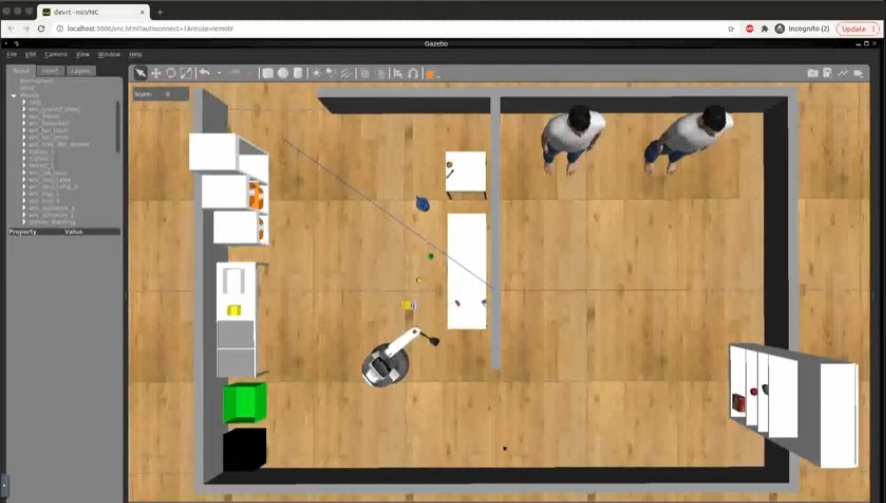Tamagawa Univ., Advanced Intelligence & Robotics Research Center
Last updated: Jun. 27, 2023
Practical evaluation of home service robots through a robot competition
As fundamental research, we study robot hardware and development environments to propose functions for practical home service robots and robot usage. As applied research, we aim to establish a standard test method for service robot competitions using competition tasks in RoboCup.
Member
- Yoshiaki Mizuchi, Lecturer, Tamagawa University
- Tetsunari Inamura, Professor, Tamagawa University
- Hiroyuki Okada, Professor, Tamagawa University
- Luis Contreras, Researcher, Tamagawa University
Link
- AIBot: https://www.tamagawa.jp/research/brain_e/aibot.html
- Team eR@sers: https://trcp.gitlab.io/erasers/
- YouTube (eR@sers): https://www.youtube.com/channel/UCK8k9MFEiDF0gKh_swZkkMw
- SIGVerse: http://www.sigverse.org/wiki/en
- RoboCup@Home Simulation: https://sites.google.com/view/robocup-athome-sim/home
RoboCup@Home Simulation DSPL
Although the skills required to solve isolated robotics problems are reaching amazing performances recently, we proposed the evaluation of such individual solutions in fully integrated robot systems tested in real daily situations like those presented at international robotics competitions. The simulation Domestic Standard Platform League (sDSPL), which utilizes the HSR simulator developed for the World Robot Summit, surges from the necessity to standardise and spread the research on Domestic Service Robots where a series of solutions can be tested to solve a general-purpose task in a standard domestic environment; this approach has been proven successful at several international competitions, namely, the RoboCup Japan Open, the Mexican Tournament of Robotics, and the RoboCup 2021.

A cloud-based VR platform for social and embodied human-robot interaction: SIGVerse
Research on Human-Robot Interaction (HRI) requires the substantial consideration of an experimental design, as well as a significant amount of time to practice the subject experiment. Recent technology in virtual reality (VR) can potentially address these time and effort challenges. The significant advantages of VR systems for HRI are: 1) cost reduction, as experimental facilities are not required in a real environment; 2) provision of the same environmental and embodied interaction conditions to test subjects; 3) visualization of arbitrary information and situations that cannot occur in reality, such as playback of past experiences, and 4) ease of access to an immersive and natural interface for robot/avatar teleoperations. Although VR tools with their features have been applied and developed in previous HRI research, all-encompassing tools or frameworks remain unavailable. In particular, the benefits of integration with cloud computing have not been comprehensively considered. Hence, the purpose of this study is to propose a research platform that can comprehensively provide the elements required for HRI research by integrating VR and cloud technologies. To realize a flexible and reusable system, we developed a real-time bridging mechanism between the robot operating system (ROS) and Unity. To confirm the feasibility of the system in a practical HRI scenario, we applied the proposed system to three case studies, including a robot competition named RoboCup@Home. via these case studies, we validated the system’s usefulness and its potential for the development and evaluation of social intelligence via multimodal HRI.

References
- L. Contreras, Y. Matsusaka, H. Okada, and T. Yamamoto, ”sDSPL – Towards a benchmark for general-purpose task evaluation in domestic service robots”, The 39th Annual Conference of the Robotics Society of Japan, 2021. [Link]
- T. Inamura and M. Yoshiaki. 2021. “SIGVerse: A Cloud-Based VR Platform for Research on Multimodal Human-Robot Interaction.” Frontiers in Robotics and AI 8 (May): doi: 10.3389/frobt.2021.549360. [Link]